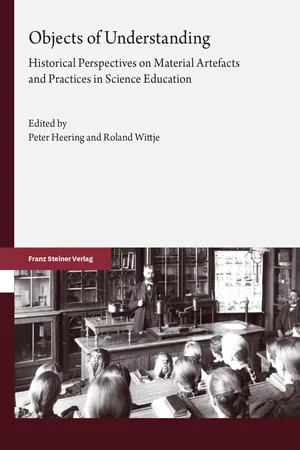
Objects of Understanding
Historical Perspectives on Material Artefacts and Practices in Science Education
- 324 pages
- English
- PDF
- Available on iOS & Android
Objects of Understanding
Historical Perspectives on Material Artefacts and Practices in Science Education
About this book
"Objects of Understanding" brings together studies of artifacts, collections, and practices in science education from the early 18th century to contemporary times. Even though science education plays a crucial role in the formation, stabilisation, dissemination, transfer and transformation of scientific knowledge and practices, its history remains still an underexplored topic.
This is true even more so for its material cultures and practices. Demonstration, experimentation by teachers and students, model making and dissection, but also image projection and showcasing objects have been central to science education throughout its history. Extensive teaching collections, teaching infrastructure and the architecture at schools, colleges and universities bear witness to the importance of these cultures and practices. The Chapters from various disciplines, geographical regions and contexts demonstrate the richness as well as the high potential of the field.
Frequently asked questions
- Essential is ideal for learners and professionals who enjoy exploring a wide range of subjects. Access the Essential Library with 800,000+ trusted titles and best-sellers across business, personal growth, and the humanities. Includes unlimited reading time and Standard Read Aloud voice.
- Complete: Perfect for advanced learners and researchers needing full, unrestricted access. Unlock 1.4M+ books across hundreds of subjects, including academic and specialized titles. The Complete Plan also includes advanced features like Premium Read Aloud and Research Assistant.
Please note we cannot support devices running on iOS 13 and Android 7 or earlier. Learn more about using the app.
Information
Table of contents
- Table of Contents
- Peter Heering / Roland Wittje: Introduction. Objects of Understanding – Historical Perspectives on Material Artefacts and Prac ices in Science Education
- Sofia Talas: At the Beginnings of Experimental Physics Teaching
- Jip van Besouw / Pieter T. L. Beck: From Throw to Flow, and Back. Fountains for Research and Teaching in 18th-Century Leiden
- Peter Heering: ’s Gravesande’s Hydrostatic Balance(s). Performative Aspects in a Demonstration Device
- Stephen Johnston: Object Lessons from the Asylum. The Portable Museum of Thomas E. Dexter
- Kristin Halverson: Instructing Instruments. Teaching Ophthalmoscopes, Laryngoscopes, Rhinoscopes, and Endoscopes in Swedish and Danish Medical Journals, 1850–1865
- Jean Davoigneau / Delphine Issenmann /Loïc Jeanson: Two Meridian Rooms. Teaching and Research at the Strasbourg Astronomical Oservatory
- Jörg Zaun / Kirsten Vincenz: The Object Tableau as a Didactic form of Knowledge Representation
- María Gabriela Mayoni: Artifacts and Pedagogical Practices for Natural History Teaching in Argentinian Secondary Education in the Late 19th Century
- Panagiotis Lazos: Demonstrating the Vibrations of an Incandescent Wire. The Journey of Argyropoulos Apparatus from Athens to Western Europe
- Jamilla Notebaard / Dulce da Rocha Gonçalves: Academic and Public Lantern Lectures in the Netherlands through the Lens of the Educational Dispositif (ca. 1900s–1920s)
- Richard L. Kremer: Introducing Electronic Apparatus into Physics Teaching in the 1920–1930s
- David P. D. Munns: The Atom Goes to College. Nuclear Engineering, Teaching Reactors, and the Atomic Age
- Roland Wittje: Training Engineers in India. German Instruments, Methods, and Transcultural Insights at IIT Madras
- Rosanna Evans: A Culture of Creativity. Handmaking School Science Equipment in England in the Second Half of the Twentieth Century
- Jochen Lange: Designing Objects of Understanding. The Practice of Manufacturing School Artefacts in the Educational Tool Industry of the 21st Century